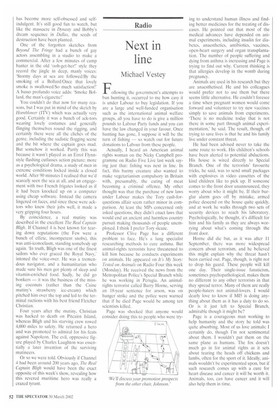Next in line
Michael Vestey
Following the government's attempts to ban hunting it, occurred to me how easy it is under Labour to buy legislation. If you are a large and well-funded organisation such as the international animal welfare groups, all you have to do is give a million pounds to Labour Party funds and you can have the law changed in your favour. Once hunting has gone, I suppose it will be the turn of fishing — so watch out for future donations to Labour from these people.
Actually, I heard an American animal rights woman on the Nicky Campbell programme on Radio Five Live last week saying just that: fishing was next in line. In fact, this barmy creature also wanted to make vegetarianism compulsory in Britain with, presumably, the eating of meat becoming a criminal offence. My other thought was that the purchase of new laws under Labour makes the Tory cash-forquestions affair seem rather minor in comparison. At least the MPs concerned only asked questions, they didn't enact laws that would end an ancient and harmless country pursuit making thousands of people unemployed. [think I prefer Tory sleaze.
Professor Clive Page has a different problem to face. He's a lung specialist researching methods to cure asthma. But animal-rights terrorists have threatened to kill him because he conducts experiments on animals. He appeared on It's My Story: Tested on Animals on Radio Four this week (Monday). He received the news from the Metropolitan Police's Special Branch while he was working in Perugia. An animalrights terrorist called Barry Home, serving an 18-year sentence for arson, was on hunger strike and the police were warned that if he died Page would be among ten scientists killed.
Page was shocked that anyone would consider doing this to people who were try mg to understand human illness and finding better medicines for the treating of diseases. He pointed out that most of the medical advances have depended on animal experiments, including insulin for diabetes, anaesthetics, antibiotics, vaccines, open-heart surgery and organ transplantation. The number of people suffering and dying from asthma is increasing and Page is trying to find out why. Current thinking is that allergies develop in the womb during pregnancy.
Animals are used in his research but they are anaesthetised. He and his colleagues would prefer not to use them but there seems little alternative. He couldn't foresee a time when pregnant women would come forward and volunteer to try new vaccines simply to save animals from experiments. 'There is no medicine today that is not there in some part through animal experimentation,' he said. The result, though, of trying to save lives is that he and his family live under constant threat.
He had been advised never to take the same route to work. His children's schools have been alerted to potential abductions. His house is wired directly to Special Branch. One of the terrorists' favourite tricks, he said, was to send small packages with explosives in video cassettes of the kind children like to pick up. If someone comes to the front door unannounced, they worry about who it might be. If their burglar alarm goes off by mistake, armed police descend on the house quite quickly, and at work he walks through two sets of security devices to reach his laboratory. Psychologically, he thought, it's difficult for him and his family as they are always worrying about what's coming through the front door.
Horne did die but, as it was after 11 September, there was more widespread concern about terrorism, and he believed this might explain why the threat hasn't been carried out. Page, though, is right not to drop his guard. These people will kill one day. Their single-issue fanaticism, sometimes psychopathological, makes them no different to any other terrorists in that they spread terror. Many of them are really people-haters not animal-lovers. I would dearly love to know if MI5 is doing anything about them as it has a duty to do so. Or is it just left to Special Branch, admirable though it might be?
Page is a courageous man working to help humanity and the story he told was quite absorbing. Most of us love animals; I certainly do, though I'm not sentimental about them. I wouldn't put them on the same plane as humans. The fox doesn't much go in for animal rights as it sets about tearing the heads off chickens and lambs, often for the sport of it. Ideally, animals wouldn't be experimented upon, but if such research comes up with a cure for heart disease and cancer it will be worth it. Animals, too, can have cancer and it will also help them in time.


































































 Previous page
Previous page